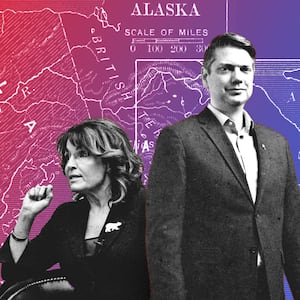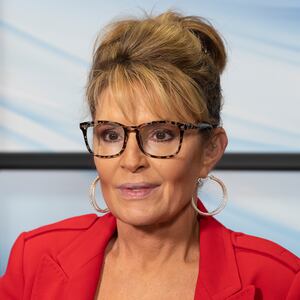ANCHORAGE, Alaska—Sarah Palin may have been away from politics for over a decade, but one thing hasn’t changed: When she’s handed a microphone, anything can happen.
But what happened during one of Palin’s most high-profile appearances of her campaign for Congress was emblematic of the somewhat surreal, extremely personal race she’s run. It’s been so bizarre that she just might pave the way for a Democrat—who happens to be a good friend—to win in November over herself and another Republican, whom she happens to strongly dislike.
On Saturday, Palin appeared alongside her rivals in that race—Rep. Mary Peltola, the Democrat who won August’s special election, and Republican Nick Begich—for a candidate forum at the Alaska Federation of Natives annual convention.
In essentially the same breath, Palin called for the investigation of President Joe Biden for “illegal activities” and then all but endorsed her friend Peltola.
“This is the toughest campaign, because of her. Mary!” Palin exclaimed. “Doggone it, I never have anything to gripe about, I just wish she’d convert on over to the other party. But other than that, love her.”
More importantly to the race, as much as Palin loves Peltola, she may detest Begich.
Since both entered the race to replace the late Rep. Don Young, Palin and Begich—two brand names in Alaska politics—have feuded in bitter and personal fashion.
And because of Alaska’s unique election system, what Palin said at the convention—which was broadcast to a statewide audience—amounted to “just a big FU to Begich,” as one Alaska Republican told The Daily Beast.
The state uses a system called ranked choice voting, where voters are asked to rank multiple candidates of all parties in order of preference. If no candidate gets a majority on the first round, those who voted for the last-place candidate will see their votes transferred to their second choice.
If Republicans dutifully toed the party line and ranked Palin and Begich as their top two candidates, they might have a strong shot of winning back Alaska’s House seat. But Palin has long resisted telling her supporters to “rank the red,” and has trashed Begich while praising Peltola.
Continuing to give her supporters essentially a green light to back Peltola, as Palin did over the weekend, is what makes many Alaska political observers bullish that the Democrat will repeat her upset and win a full two-year term in November.
But Palin’s love for Peltola—and hatred for Begich—does not appear to be some Machiavellian strategy to beat the ranked choice system. Peltola is likely to place first on the initial round of voting, so the race will hinge on who the last place finisher’s supporters rank second. If Palin finishes last, she may well take Begich down with her.
As tempting as it may be to think of Palin imploring her voters to rank Peltola second as a strategy to force Republicans to vote for her or hand the seat to a Democrat, it seems far more based on honest personal preference—a true statement of both hatred and admiration.
Meanwhile, Peltola is also taking a kind tack with the former vice presidential nominee. The nastiest thing Peltola will say about Palin—and she’s been given many opportunities to tee off—is that the former governor looked far more glamorous than she did when both were pregnant at the same time while serving in the Alaska State Capitol. “If I don’t like her, it’s only because she looked so much better,” Peltola told The Daily Beast.
“Sarah has a genuine relationship with Mary dating from their time in Juneau, and a genuine dislike of Nick,” said Jonathan Kreiss-Tomkins, a Democratic state lawmaker. “I think her actions show that she’s ultimately relationship-driven, as much as those in the GOP wish she would do otherwise.”
But the fact that Palin’s beef with Begich and her fondness for Peltola could tip the race is just one of several characteristically strange things about the former governor’s return to the spotlight, 14 years after she first rocketed to national prominence as John McCain’s running-mate in 2008.
According to a number of Alaska insiders and voters interviewed by The Daily Beast, Palin has run a low-key campaign. Beyond occasional interviews with Alaska media, she has eschewed the traditional campaign trail and isn’t running much in the way of TV or radio ads. The Daily Beast attempted to contact the Palin campaign through her website to inquire about her campaign schedule but did not receive a reply.
Meanwhile, Palin’s critics often accuse her of the worst possible sin in Alaska politics: spending too much time in the Lower 48. “I'm out every single day working hard, and Sarah’s spent a lot of time out of state,” Begich said, in an interview with The Daily Beast. “People have noticed that.”
Despite having the “Complete and Total Endorsement” of former President Donald Trump, Palin has alienated most of the conservative establishment and rank-and-file party activists of Alaska, who are largely supporting Begich. And many Alaskans have a strong distaste left in their mouths from Palin’s resignation as governor in 2009, which many saw as tantamount to quitting on the state.
Yet, despite it all, Palin retains considerable support, and virtually every Alaska voter knows who she is. In the August special election, she got 31 percent of the vote on the first ballot, edging out Begich, who got 28 percent. That outcome puzzled many in Alaska—and some can’t decide whether it’s a sign of her enduring sway or her irrelevance in a state that has moved on without her.
“The people who still love her really deeply love her,” said Joelle Hall, executive director of the Alaska AFL-CIO. “It’s just a way smaller number than I think she thought it was going to be.”
Although the Alaska race is increasingly getting attention not because of Palin but Peltola, the former governor and her outsized shadow continues to loom large over the race. And nowhere is that clearer than on the campaign trail with Begich.
In Alaska, Begich has as notable a name as Palin’s. His grandfather, Nick Begich Sr., was the state’s Democratic congressman until his death in a plane crash in 1972. His uncle, Mark Begich, was a Democratic U.S. senator from 2009 to 2015 and the former mayor of Anchorage.
On Friday, Begich supporters held a birthday fundraiser for him in an airplane hangar at the edge of the Anchorage airport. At times, Palin’s presence was inescapable—and not just because her former in-laws were in the crowd supporting Begich.
Jim Palin, the father of Palin’s ex-husband Todd, has publicly endorsed Begich. He told The Daily Beast it’s nothing personal against his former daughter-in-law: “We believe strongly he is the best candidate for the position. Real simple,” Palin said. “We’re proud to be supporting him.”
When asked why he believes so many Alaskans continue to support the former governor, Palin was at a loss.
“I can’t answer that one, I really can’t,” he said. “She’s been really out of the scene for quite a few years. She’s always been very popular, no question about that, but Nick Begich got into this campaign over a year ago, and he’s been at it hard and fast doing the right thing, and we’re proud to be supporting him.”
In interviews and on the stump, Begich is sharp, prepared, and smooth as a seasoned politician—in other words, everything Palin is not. But even in his disciplined remarks, she is frequently a foil.
Riffing on Alaska’s national significance at his fundraiser, Begich couldn’t help but make an allusion to one of Palin’s defining gaffes of the 2008 campaign—burnishing her national security appeal by saying that Russia was visible from Alaska, which was subjected to a brutal parody from Tina Fey on Saturday Night Live.
“For a lot of people, we're just a curiosity, but we need to be more than that,” Begich said. “And, oh yeah, there is Russia, right there. I’ll say it too, it’s right next door.” At that, the crowd burst out in laughter.
But asked how he navigates the long shadow that Palin and her reputation casts on Alaska, Begich has a characteristically disciplined answer.
“Your question answers itself, because her reputation is so well-known. Everyone in Alaska already has an opinion formed about Sarah Palin,” Begich said. “And my race hasn't been about Sarah. It's about the future of the state of Alaska—that’s where the focus has been and that’s where voters have been resonating with my campaign.”
Begich and his allies insist that, despite Palin’s eagerness to praise Peltola and her reluctance to play by the rules of the ranked choice system, he is in a better position to win in November than in August. He told The Daily Beast there may be as many as 100,000 voters who did not participate in the special election who could show up in November.
Plus, Begich said, Republicans are finally getting the hang of the strategy of ranked choice voting—even as party leaders continue to slam the system as “corrupt,” as Trump did in a social media post on Monday.
“It's a really complex message to communicate, because it's not intuitive, but people are starting to understand,” Begich said. “Many people after these events are coming up to me saying, ‘yeah, I ranked someone else first previously, but now you're my number one choice.’”
For some in Alaska politics, one of the more fascinating aspects of Palin’s comeback is how much her reaction to Peltola reminds them of Palin herself.
When Palin won her 2006 campaign for Alaska governor, she cobbled together an unusual political coalition with a populist and anti-establishment appeal—not to mention a serious amount of personal charisma.
“This thing you see about Mary, this starstruck adoration, is exactly how people felt about Sarah Palin,” said Hall, of the AFL-CIO. “She was adored, thronged, mobbed. She wasn’t famous yet—it’s just that people really liked what she had to say.”
With Peltola on a path to becoming Alaska’s latest political star—and Palin’s comeback bid on the precipice of stalling—the former governor couldn’t seem to resist getting on the bandwagon herself.
“We are in Mary’s house, and I know that,” Palin told the crowd at the Alaska Natives convention. ‘I was proud of her as all of you are.”










